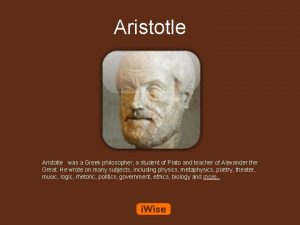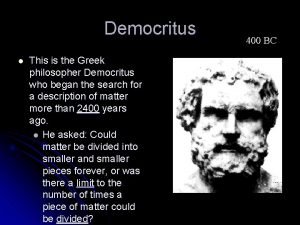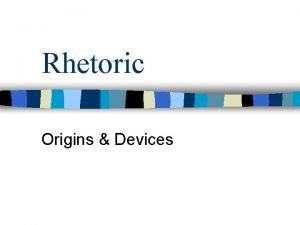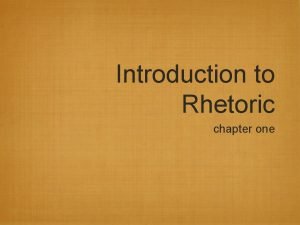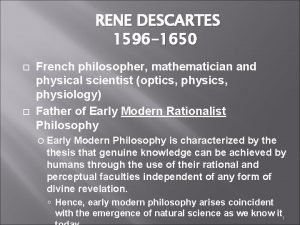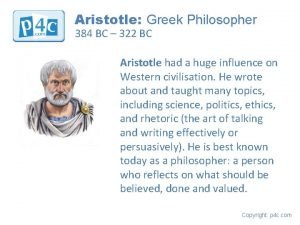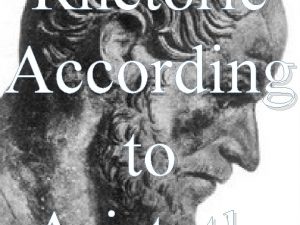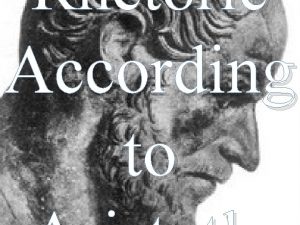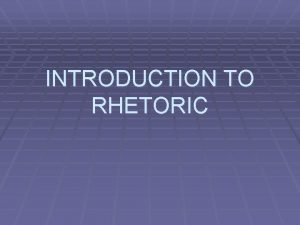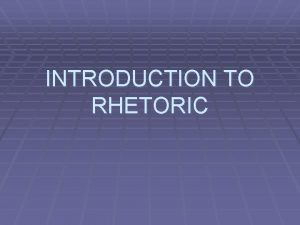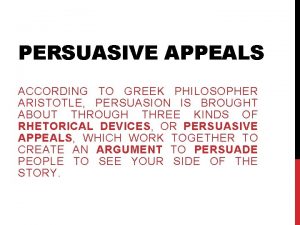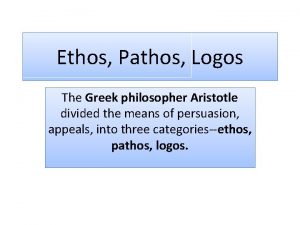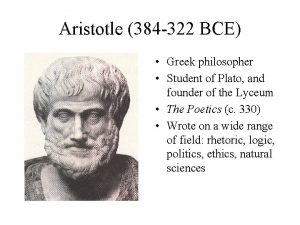Rhetoric The Greek Philosopher Aristotle defined rhetoric as


















- Slides: 18

Rhetoric The Greek Philosopher Aristotle defined rhetoric as “the faculty of observing in any given case the available means of persuasion. ”

Rhetoric o. In other words, rhetoric is a thoughtful, reflective activity leading to effective communication, including rational exchange of opposing viewpoints.

Rhetoric o. The study of the effective use of language

Rhetoric is Always Situational o It has context- the occasion or the time and place it was written or spoken o It has purpose- the goal that the speaker or writer wants to achieve

Purpose o When we consider a text’s purpose, we can look at whether the speaker is trying to: n n n Win agreement Persuade us to take action Evoke sympathy Make someone laugh Inform Provoke

Purpose o When we consider a text’s purpose, we can look at whether the speaker is trying to: n n n Celebrate Repudiate Put forth a proposal Secure support Bring about a favorable decision

The Writer’s Relationship to their Subject o Writers must first choose their subject and then evaluate what they already know about it, what others have said about it, and what kind of evidence or proof will sufficiently develop their position.

The Writer’s Persona o Writers often assume what Aristotle called a persona- the character the writer creates when she or he writes or speaks- depending on the context, purpose, subject, and audience.

The Writer’s Relationship to their Audience o A writer should ask themselves: n What does the audience know about the subject? n What is the audience’s attitude toward the subject? n Is there a common ground that is shared between the audience and me?

Ethos o Writers and public speakers appeal to an audience’s ethos, or character, to demonstrate that they are credible and trustworthy.

Ethos o The writer’s or speaker’s ethos - expertise and knowledge, experience, training, sincerity, or a combination of thesegives the audience a reason for listening.

Logos o Writers and public speakers appeal to an audience’s logos, or reason, by offering clear, rational ideas.

Logos o Appealing to logos (Greek, “embodied thought”) means having a clear main idea, or thesis, with specific details, examples, facts, statistical data, or expert testimony as support.

Logos o A good way to appeal to logos is to acknowledge a counterargument- that is, to anticipate objections or opposing views.

Logos o In acknowledging the counterargument, you agree (concede) that an opposing argument may be true, but then you deny (refute) the validity of all or part of the argument.

Logos o This concession and refutation actually strengthens your argument; it appeals to logos by demonstrating that you considered your subject carefully before making your argument.

Pathos o Writers and public speakers appeal to an audience’s pathos, or emotion.

Pathos o Emotional appeals usually include vivid, concrete description and figurative language. In addition, visual elements often carry a strong emotional appeal.
 Greek philosopher aristotle teacher
Greek philosopher aristotle teacher Which ancient greek philosopher defined tragedy?
Which ancient greek philosopher defined tragedy? Which greek philosopher defined the art of persuasion
Which greek philosopher defined the art of persuasion Greek philosopher plato teacher
Greek philosopher plato teacher Greek philosopher democritus
Greek philosopher democritus Appeal to pathos
Appeal to pathos Aristotle rhetoric
Aristotle rhetoric How is rhetoric defined in this chapter?
How is rhetoric defined in this chapter? Hubris aristotle definition
Hubris aristotle definition Well defined set
Well defined set Oedipus rex
Oedipus rex Aristotle university of thessaloniki greek language course
Aristotle university of thessaloniki greek language course The philosopher king plato
The philosopher king plato Weeping philosopher
Weeping philosopher French philosopher mathematician
French philosopher mathematician Harry potter similes
Harry potter similes Philosopher of cordoba
Philosopher of cordoba American philosopher
American philosopher Philosopher giving a lecture on the orrery
Philosopher giving a lecture on the orrery
